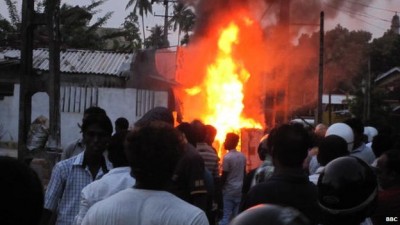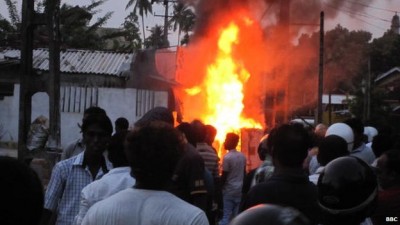 Sri Lanka extended curfews in a popular tourist region Monday after a rampaging Buddhist mob killed three Muslims and burned dozens of homes and shops, the latest outbreak of religious violence on the island.
Sri Lanka extended curfews in a popular tourist region Monday after a rampaging Buddhist mob killed three Muslims and burned dozens of homes and shops, the latest outbreak of religious violence on the island.
Community leaders accused authorities of doing little to prevent Sunday night’s violence, with the most senior Muslim member of President Mahinda Rajapakse’s government threatening to resign at the decision to allow militant Buddhists to rally in the flashpoint region. “Three deaths have occurred and 78 people have been seriously wounded in the mob attacks… Places of Muslim religious worship have also been attacked with total impunity,” Justice Minister Rauf Hakeem said as he toured the damage in the neighbouring towns of Alutgama and Beruwala.
“The government allowed the Bodu Bala Sena (BBS) to hold their gathering and therefore they must take responsibility for what has happened,” he said, referring to a hardline outfit better known as the Buddhist Force. Hakeem told reporters that he was now under pressure from his own supporters to quit the government to protest the failure to prevent the attacks, the latest in a series of violent incidents involving the BBS.
The unrest erupted on Sunday night when followers of the BBS staged a protest over a recent road rage incident in the area. After stones were allegedly thrown at them, the BBS supporters then tore through the two towns, attacking people on the street and setting fire to property. Several mosques were also damaged. Local residents said police did little to protect them when the Buddhist mobs started their onslaught around sundown in the mainly Muslim towns which are around 60 kilometres (37 miles) south of the capital Colombo.
Police fired teargas and imposed a night-time curfew but the violence went on for several hours, according to residents. “We pleaded with the police to come and stop the mob attacking our houses but the police did nothing,” said Mujahedeen, a resident of Alutgama’s Milton Road where around a dozen buildings were set on fire. Police chief N.K. Illangakoon said the situation was “improving” although the curfew would remain overnight Monday. “The situation is improving and police, the Special Task Force (commandos) and the army have been deployed to ensure security,” Illangakoon said in a statement.
Both towns are popular beach resorts frequented by international tourists, but there were no reports of any foreigners or hotels being caught up in the violence. However, several hotels told their guests to remain indoors and Western embassies advised their nationals to avoid travelling to the region until further notice. Rajapakse, currently in Bolivia, said in a statement that he would not allow “anyone to take the law into their own hands” and urged “restraint”.The attacks are the latest in a series of religious clashes to hit the island following unrest in January and also last year when Buddhist mobs attacked a mosque in the capital Colombo.
The United States, which has led international condemnation of Sri Lanka’s human rights record, urged Colombo to end the violence. “We urge the government to ensure that order is preserved and the lives of all citizens, places of worship, and property are protected,” the US embassy said in a statement. BBS leader, Buddhist monk Galagodaatte Gnanasara, is currently on bail after being arrested in May on a charge of insulting the Koran. The latest unrest came weeks after Muslim legislators asked Rajapakse to protect their community from “Buddhist extremist elements”.
Videos posted on YouTube have shown mobs led by Buddhist monks throwing stones and smashing a Christian prayer centre in southern Sri Lanka in January this year and attacking mosques while police looked on. Senior Buddhist monks have also been caught on video threatening violence against their moderate colleagues who advocate tolerance. Sri Lanka, facing an international probe of its war record in crushing separatists Tamil rebels in may 2009, is also criticised for its alleged failure to protect minority religious groups. Muslims make up about 10 percent of Sri Lanka’s 20 million population, but are accused by nationalists of having undue influence.
Daily Times


Leave a Reply
You must be logged in to post a comment.